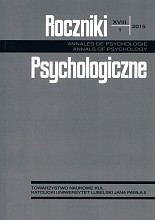Dyskusja „po Stapelu”. Wokół rzetelności badań i publikacji w psychologii
Post-Stapelian psychology. Discussions on the reliability of data and publications in psychology
Author(s): Łukasz BudziczSubject(s): Psychology
Published by: Towarzystwo Naukowe KUL & Katolicki Uniwersytet Lubelski Jana Pawła II
Keywords: fraud in psychology; Diederik Stapel; “false-positive psychology;” publication bias
Summary/Abstract: In 2011, Diederik Stapel’s fraud was discovered. It turned out that not only did Stapel forge data but also journals failed to notice many obvious errors and encouraged distortions (e.g., not reporting studies with non-significant results). Simultaneously, Simmons et al. (2011) published an article dedicated to questionable research practices that could significantly increase the number of false-positive results through arbitrary decisions pertaining to data analysis and presentation. Shortly after, there appeared results of studies suggesting that a large number of researchers confess to such practices and that they are, in fact, commonly accepted. These events sparked off a wide debate about the reliability of data in psychology. The author of the present paper discusses the most important points of this debate, showing how the low level of theoretical maturity, the lack of consensus on the rules of applying research techniques and interpreting results, and the unrealistic demands of editors of empirical journals may have contributed to this crisis.
Journal: Roczniki Psychologiczne
- Issue Year: 18/2015
- Issue No: 1
- Page Range: 9-24
- Page Count: 16

